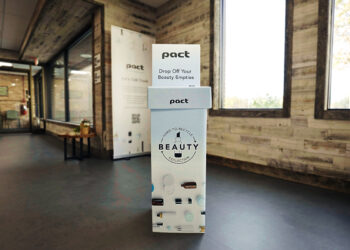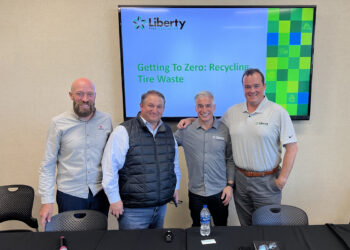Although a designated producer responsibility organization (PRO) receives much of the attention for any state’s emerging extended producer responsibility (EPR) plan for packaging, independent PROs quietly address more specialized needs.
As one of the first states to pass EPR legislation for packaging, Colorado is in the spotlight as it approaches implementation in early 2026. In September, the state’s Department of Public Health and Environment approved an individual program plan from the Lubricants Packaging Management Association (LPMA) – the first instance for an independent PRO.
“We’re very proud to be first,” said David Lawes, CEO of LPMA powered by Interchange 360.
In 2024, BP Lubricants USA (parent company of Castrol), Chevron USA, ExxonMobil, Pennzoil-Quaker State (which is owned by Shell) and VGP Holdings (parent company of Valvoline) became the founding members of LPMA, which is administered by Interchange 360. The group handles discarded packaging for such products as lubricating oil, oil filters, antifreeze and diesel exhaust fluid.
In an interview with Resource Recycling, Lawes said Colorado’s EPR law wasn’t one-size-fits-all. “What’s really unique about Colorado is – and I think the regulators absolutely got it right here – is they allowed for producers to choose how they want to put this all together to be able to respond to the regulation,” he said.
The need for LPMA is “a lot like PaintCare, where it makes sense to manage the product separately,” he said, referring to the PRO administering paint stewardship programs in 10 states including Colorado and in Washington, DC.
The action is “a signal to the industry that independent programs can get approval and can work. It’s also a signal to state regulators about how necessary it is to have an independent pathway,” Lawes said. “Products like ours that don’t fit so well in the curbside program – petroleum containers, motor oil containers with a little bit of residual oil in there – they don’t do well in the curbside program.”
Nevertheless, the group has encountered resistance from both industry and legislators. “EPR is still pretty new in the US and so the industry is just learning this now. And a single PRO sounds simple until it’s not,” Lawes said. He added that although a single PRO can be very effective at managing curbside collection, materials such as paint and film and flexible packaging present unique challenges.
“I know that it’s simple to ask for one PRO, until it’s not. If you’re the regulator and you’re restricting that choice, it always comes back on the regulator: Why did you restrict that choice?” A regulator for EPR programs for 10 years in Canada, Lawes cited the lawsuit over Oregon’s EPR law as the result of restricting choice.
“So I can see this evolution happening, where states are removing the restriction of choice, moving away from the single PRO option and allowing industry to produce a plan that demonstrates how they can collect this stuff separately and how it’s efficient to do that through better environmental outcomes.”
The Colorado experience highlighted the importance of engaging with state regulators, Lawes said, a point echoed in the Texas attempt to introduce a bottle deposit return scheme. That engagement helps all parties understand the intent behind each law’s clauses and how producers can incorporate them in practice, he said.
Looking ahead, Lawes said California, Maine, Maryland and Washington seemed likely to incorporate independent PROs into their new EPR laws. “One of the key tenets of extended producer responsibility, right after results-based, is producer flexibility. Producers have the ability to arrange themselves to comply with the law and meet the targets. And so this is a key tenet that we’re asking all states to adopt in extended producer responsibility where producers can choose and not have the state dictate that it’s a single PRO.”
The key, he said, is to have a choice, whether producers choose to join the primary PRO, or to develop their own program. “As long as everybody’s on a level playing field, everybody’s meeting the same outcome.”
The business case for independent PRO
That small amount of oil is a contaminant in curbside programs, leading to “quite high” fees. “And if we can have a separate collection system for petroleum containers, we can manage costs and likely have better, more circular outcomes,” he said, adding that producers in the petroleum sector have the requisite experience handling such containers.
“The good news is there’s a business case for managing it separately,” Lawes said. “We can manage the cost better for this sector.” In states implementing EPR for packaging, producers sign up with a PRO, such as LPMA or CAA. “Some producers are quick to come to the table, and some come a little later.”
This is typical for an EPR program, especially the first one in the US, Lawes said, drawing from his years of experience administering and regulating EPR programs in Canada. “So many producers are just still learning EPR. They’re at very different stages of learning as well, so we’re doing a lot of education work with the petroleum producer group.”
He added that the five oil majors invested both time and money in learning about EPR, but “some of the smaller entities don’t have the resources to do that, and so they’re working through it on their own timeline.”
























